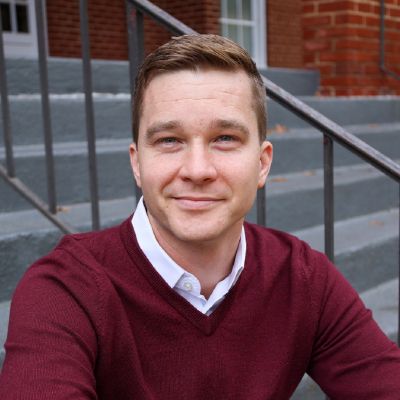
Dr. Benjamin Bergey
Eastern Mennonite University
Harrisonburg, Virginia
Knowing the immense power of music, Dr. Benjamin Bergey established an interdisciplinary major called Music and Peacebuilding at Eastern Mennonite University. “While many musicians and ensemble directors know on various levels that music helps to bring people together and make our world better, this is the first undergraduate major in the U.S. that combines the theories and practices of peacebuilding and conflict transformation with musical training,” the Assistant Professor of Music explains.
Students take core music and peacebuilding courses, and through colloquiums, concerts and community events, they experience and practice the applications of music in building peace, which increases their empathy and their ability to engage in dialogue. They must also complete an internship as well as a senior project where they combine the things that they have been learning.
“I also designed a course called Music and Peacebuilding to engage with the growing field and networks of arts-based peacebuilders, and to explore the theories and practices to use music to help transform conflict since making music together can help bridge divides and create common ground,” Bergey says.
As a small liberal arts college, EMU can adapt quickly to meet the varying needs of students, who have the opportunity to be involved in whatever they like. “The university culture is attuned to issues of social justice, inclusion and intercultural competency — values that are so helpful in cultivating a safe and inviting music department, which made developing a major like Music and Peacebuilding possible,” he says.
Bergey is always thinking outside the box to come up with solutions to help his students. He transitioned the music theory curriculum to use open educational resources (OER), which is free to students. “I received a grant from VIVA Open, a Virginia-based library consortium, and adapted and developed resources for our music theory curriculum,” he says. “We had been using expensive textbooks and workbooks for a long time, but that was not necessary. This way, students do not pay for books for their three music theory courses.”
Another solution Bergey spearheaded was during the pandemic. In the summer of 2020, he worked with others in the area to think through creative ways to still sing together in a safe way. Some used microphones and an FM transmitter to sing from their cars, which wasn’t feasible at a college. “I figured we could use PA speakers outside. All I needed were wireless microphones, a mixer, speakers and some cables to make it work,” Bergey explains. “We did that for a full year, giving students the chance to still sing during college, and we put on concerts outside for audiences, who really loved it.”
Bergey chronicled that first summer’s set up, and the choir was featured in a documentary showing the creative ways choirs were able to sing together safely during COVID.








